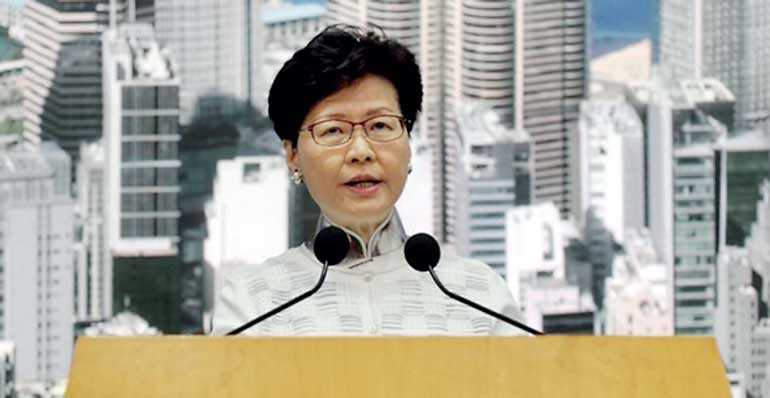Saturday Feb 21, 2026
Saturday Feb 21, 2026
Monday, 17 June 2019 00:00 - - {{hitsCtrl.values.hits}}

Hong Kong Chief Executive Carrie Lam speaks at a news conference in Hong Kong, China, 15 June – Reuters
HONG KONG (Reuters): Hong Kong leader Carrie Lam on Saturday indefinitely delayed a proposed law that would have allowed extraditions to mainland China, in a dramatic retreat after anger over the bill triggered the city’s biggest and most violent street protests in decades.
The extradition bill, which would have covered Hong Kong’s seven million residents as well as foreign and Chinese nationals there, was seen by many as a threat to the rule of law in the former British colony.
Around a million people marched through Hong Kong last Sunday to oppose the bill, according to organisers of the protest, the largest in the city since crowds came out against the bloody suppression of pro-democracy demonstrations centred around Beijing’s Tiananmen Square on 4 June 1989. Demonstrations continued through the week and were met with tear gas, bean bag rounds and rubber bullets from Police, plunging the Asian finance hub into turmoil and piling heavy pressure on Lam.
“After repeated internal deliberations over the last two days, I now announce that the Government has decided to suspend the legislative amendment exercise, restart our communication with all sectors of society, do more explanation work and listen to different views of society,” Lam told a news conference.
In her first public appearance or comments since Wednesday, she said there was no deadline, effectively suspending the process indefinitely.
Political opponents called for the bill to be scrapped completely. Protest organisers said they would go ahead with another rally on Sunday to demand Lam step down.
The about-face was one of the most significant political turnarounds under public pressure by the Hong Kong government since Britain returned the territory to China in 1997, and it threw into question Lam’s ability to continue to lead the city.
It also potentially alleviated an unwanted headache for the leadership in Beijing, which is grappling with a slowing economy and an all-consuming trade war with the US.
Asked repeatedly if she would step down, Lam avoided directly answering and appealed to the public to “give us another chance”. She said she had been a civil servant for decades and still had work she wanted to do. She added that she felt “deep sorrow and regret that the deficiencies in our work and various other factors have stirred up substantial controversies and disputes in society”. The extradition bill deliberations started in February and Lam had pushed to have it passed by July. But the protests changed the equation. Cracks began to appear on Friday in the support base for the bill with several pro-Beijing politicians and a senior adviser to Lam saying discussion of the bill should be postponed for the time being. Sing Tao newspaper reported on Saturday that China’s top official overseeing Hong Kong policy, Vice Premier Han Zheng, met Lam in Shenzhen in recent days.
Lam declined to confirm whether or not the meeting had happened, but took ownership for the decision to suspend the bill and said she had support from the central Government.
Steve Tsang, a political scientist at SOAS in London, said Beijing had most likely ordered Lam to postpone the bill. “They would have indicated to Carrie... that this just has to end. She didn’t understand what she was doing,” he said.
“I think Carrie Lam’s days are numbered... Beijing cannot afford to sack her right away, because that would be an indication of weakness.”
The Chinese Government office in charge of Hong Kong affairs expressed “support, respect and understanding” of Lam’s decision to suspend the bill.